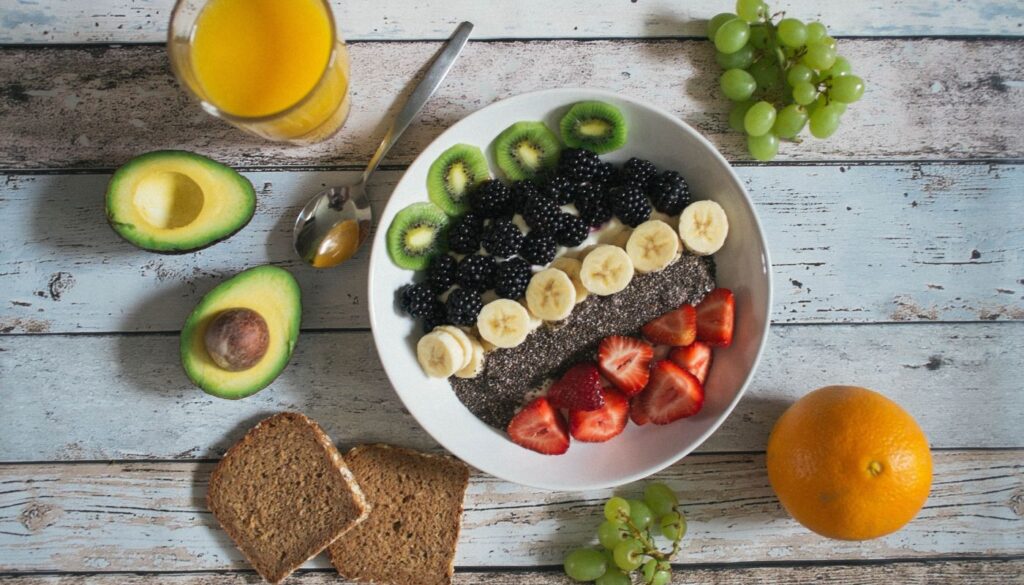Starting your day with a morning run can supercharge your energy levels and mood, but the key to unlocking your best performance might just lie in what you eat beforehand. Navigating the world of pre-run nutrition can be tricky, leaving many to wonder: what’s the best fuel for my morning miles? This article delves into the essentials of pre-run nutrition, offering insights to help you make choices that enhance your run, rather than weigh you down. Discover the secrets to a powerful start to your day.
Benefits of Eating Before Morning Runs
Embarking on a morning run without fueling your body can be likened to setting off on a long journey with little to no gas in your tank. It’s critical to understand the significant benefits that come with nourishing your body before a morning run. Firstly, eating a well-balanced meal or snack before your run can drastically improve your performance. This is because your body has been fasting overnight, and without replenishment, you’re more likely to experience fatigue earlier in your run. Consuming the right nutrients beforehand provides the necessary energy for endurance and stamina, allowing you to run further and faster.
Additionally, pre-run nutrition plays a crucial role in muscle preservation. During intense or prolonged physical activity, the body may begin to break down muscle tissue for energy. Providing your body with adequate nutrients before you start can help to prevent this muscle breakdown, promoting muscle health and recovery. Moreover, a pre-run meal helps to stabilize blood sugar levels, ensuring that you have a steady supply of energy throughout your run. This is particularly important to prevent feelings of lightheadedness or weakness that can occur with low blood sugar.
- Improved performance and endurance
- Prevention of muscle breakdown
- Stabilized blood sugar levels
- Better hydration status
- Enhanced recovery post-run
Ultimately, the key to a successful morning run lies in finding the right balance of nutrients to fuel your body without weighing you down. Opt for easily digestible foods that are rich in carbohydrates, moderate in protein, and low in fat to ensure an optimal running experience. Remember, the goal is to enhance your performance and enjoyment of the run, making pre-run nutrition an essential part of your morning routine.
Fueling Strategies for Early Morning Runs
Running in the morning is a refreshing way to start the day, but knowing what to eat beforehand can significantly impact your performance and energy levels. Consuming the right nutrients prior to your run ensures your body has the fuel it needs without causing discomfort or sluggishness during your workout.
The ideal pre-run meal should be easy to digest and rich in carbohydrates, as they are the primary fuel source for your body during exercise. Including a moderate amount of protein can also help prevent muscle damage. It’s crucial to avoid high-fat and high-fiber foods right before running, as they can lead to gastrointestinal issues and slow down digestion.
A small meal or snack about 30 to 60 minutes before your run can help boost blood sugar levels, ensuring you have the energy to complete your workout. Foods like bananas, oatmeal, or a slice of whole-grain bread with almond butter are excellent choices. They provide a good balance of carbs and proteins while being gentle on your stomach.
Nutritional Timing for Optimal Performance
| Time Before Run | Food Type | Example |
|---|---|---|
| 2-3 Hours | Complex Carbs + Protein | Whole grain toast with eggs |
| 1 Hour | Simple Carbs | Banana or small smoothie |
| 30 Minutes | Quick Carbs | Dates or a handful of raisins |
| 15 Minutes | Hydration | Water or an electrolyte drink |
| Post-Run | Protein + Carbs | Yogurt with fruit or a protein shake |
Selecting the Right Pre-Run Foods

Embarking on a morning run requires more than just willpower and a good pair of sneakers. What you eat before you hit the road or trail can significantly impact your performance, energy levels, and overall enjoyment. The key is to fuel your body with the right nutrients that will sustain you throughout your run without weighing you down. Understanding the delicate balance of macronutrients—carbohydrates, proteins, and fats—is crucial in selecting the ideal pre-run meal or snack.
Carbohydrates are your body’s preferred energy source, especially for endurance activities like running. Opting for complex carbohydrates, such as whole grains, fruits, and vegetables, provides a slow and steady release of energy, which is ideal for sustaining you throughout your run. A small, fiber-rich meal or snack can prevent hunger and provide the necessary fuel without causing gastrointestinal distress. However, it’s important to experiment with timing and portion sizes as individual tolerance can vary.
Protein plays a supporting role in pre-run nutrition, aiding in muscle repair and recovery. Including a moderate amount of protein can help stave off muscle fatigue and enhance recovery post-run. Healthy fats, though slower to digest, can also be included in small amounts. They provide a concentrated source of energy, which can be particularly beneficial for longer runs. However, the focus should primarily be on carbohydrates and protein for pre-run meals.
- Whole grain toast with banana and a small smear of almond butter
- Oatmeal topped with berries and a sprinkle of chia seeds
- A small smoothie made with leafy greens, a banana, protein powder, and almond milk
- Yogurt with granola and fruit
- A rice cake with avocado and turkey slices
Hydration is another critical component of your pre-run routine. Start hydrating the night before your run and continue with small sips of water up until you start. Avoiding large amounts right before running can help prevent discomfort. In addition, for those who run first thing in the morning, a light snack or even a cup of coffee can be enough to kickstart your system without overloading your stomach. Remember, the goal is to feel energized, not weighed down. Experiment with different foods and timings to find what works best for your body. Ultimately, the right balance of nutrients will help you optimize your performance and enjoy your run from start to finish.
Timing Your Pre-Run Meal
Understanding the optimal timing for your pre-run meal is crucial for maximizing energy levels and enhancing performance. Consuming your meal at the right moment ensures that the fuel is available when your body needs it most, while also preventing discomfort during your run. A general guideline is to eat a substantial meal about 2 to 3 hours before running. This window allows your body sufficient time to digest and convert the food into usable energy. However, if your schedule demands a closer eating window to your run, opting for a smaller, easily digestible snack 30 minutes to an hour prior can also be effective.
It’s essential to consider the intensity and duration of your planned run when timing your meal. Longer, more strenuous runs may require a more significant energy reserve, making the larger meal option more appropriate. Conversely, for a short, light jog, a small snack may suffice. Listening to your body’s signals and experimenting with different timing can help you find the most suitable approach for your individual needs.
Here is a table to help guide you in selecting the appropriate pre-run meal timing based on the duration and intensity of your run:
| Run Duration | Meal Type | Timing Before Run |
|---|---|---|
| Less than 30 minutes | Small Snack | 30 mins – 1 hour |
| 30-60 minutes | Light Meal or Snack | 1-2 hours |
| 1-2 hours | Substantial Meal | 2-3 hours |
| More than 2 hours | Substantial Meal + Snack | 2-3 hours + 30 mins before |
Adapting your pre-run meal timing to your running routine can significantly impact your energy levels and performance. Remember, individual preferences and digestive responses vary, so it’s vital to personalize your approach.
Hydration Tips for Morning Runs
Hydration is a pivotal aspect of any fitness routine, but it becomes particularly crucial when discussing morning runs. The body loses water not only through sweat during the exercise but also overnight through respiration and minor perspiration. Starting your day with a run requires preemptive steps to ensure that your hydration levels are optimized to support your physical exertion and enhance your performance. It’s not just about drinking water before you head out; it’s about maintaining a hydration strategy that begins the day before.
First and foremost, drink water throughout the day preceding your run. This doesn’t mean overloading your system right before bedtime but maintaining a steady intake during the day. Consider incorporating beverages that aid hydration without excessive sugars or caffeine, such as herbal teas or infused water, which can add an element of variety and make it easier to keep your fluid intake high. It’s also beneficial to include water-rich foods in your diet, such as cucumbers, lettuce, and watermelon, which can help maintain hydration levels.
On the morning of your run, try to drink at least 8 ounces (about a glass) of water about 30 minutes before you begin. This allows your body time to process the water and minimizes the risk of discomfort during your run. However, it’s essential to listen to your body and adjust according to your needs and the weather conditions. Hotter weather will increase your need for fluids, as will a more intense or prolonged workout. Remember, though, that hydration doesn’t end with water. Replenishing electrolytes is also vital, especially after your run, to restore the balance of minerals lost through sweat. Options like coconut water, or a small snack with a pinch of salt, can be effective ways to replenish these essential nutrients.
Further Insights on Hydration for Runners
Understanding the balance between hydration and overhydration is crucial. While it’s important to stay adequately hydrated, overhydration can lead to hyponatremia, a condition where the sodium levels in your blood become dangerously low. Signs of both dehydration and overhydration can be subtle but can significantly impact your health and running performance. Monitoring the color of your urine is a simple and effective way to gauge your hydration status. Aim for a pale straw color as an indicator of proper hydration.
Optimizing Hydration Strategies for Enhanced Running Performance
- Monitor your urine color for hydration levels.
- Pre-hydrate by drinking water throughout the day before your run.
- Incorporate water-rich foods into your diet.
- Adjust your fluid intake based on the weather and intensity of your run.
- Replenish electrolytes post-run to restore mineral balance.
By adopting a comprehensive hydration strategy, you can significantly improve your running performance, recovery, and overall health. It’s not only about the quantity of water you drink but also when and how you hydrate. Remember, your hydration needs are as unique as your fitness journey, so tailor these tips to suit your individual requirements and preferences. Happy running!
Common Mistakes to Avoid
Navigating the pre-run meal is vital for optimizing your performance and enjoyment. However, many runners fall into dietary traps that can hinder their progress. Understanding these pitfalls can significantly enhance your running experience. First and foremost, timing is crucial. Eating too close to your run can lead to discomfort and gastrointestinal issues, while eating too far in advance might leave you feeling depleted. Aim for a balance, consuming a light, energizing meal about 30 to 60 minutes before heading out.
Another common mistake is focusing solely on carbohydrates. While carbs are essential for fueling your runs, neglecting protein and healthy fats can be detrimental in the long run. These nutrients are crucial for muscle repair and sustained energy. Including a moderate amount of protein and healthy fats in your pre-run meal can make a substantial difference in your performance and recovery. Lastly, hydration is often overlooked. Many runners focus on their solid food intake without considering their fluid needs. Starting your run well-hydrated is as important as the meal itself, so ensure you’re drinking enough water before you hit the pavement.
Avoiding overly complex or high-fiber foods right before running can also prevent unwanted digestive issues. Opting for simple, easily digestible foods will keep your energy levels up without weighing you down. Remember, personal tolerance varies, so it’s essential to experiment with different foods and timings to discover what works best for you.
Optimal Pre-Run Meal Composition
Creating the perfect pre-run meal involves balancing various nutrients to fuel your body without causing discomfort. Here’s a guide to help you compose your meals effectively:
| Nutrient | Benefits | Example Foods |
|---|---|---|
| Carbohydrates | Quick energy source | Bananas, oatmeal, white bread |
| Protein | Supports muscle repair | Greek yogurt, eggs, almond butter |
| Healthy Fats | Sustained energy | Avocado, nuts, chia seeds |
| Hydration | Prevents dehydration | Water, electrolyte drinks |
| Simple Sugars | Immediate energy boost | Honey, maple syrup, dates |
When composing your pre-run meal, consider the duration and intensity of your run. Shorter, less intense runs might only require a small snack or even just proper hydration, especially if you’re running first thing in the morning. For longer or more vigorous runs, a more substantial meal might be necessary to keep your energy levels consistent. Experimenting with different foods and quantities can help you find the perfect balance for your body and running needs.
Sample Pre-Run Breakfast Ideas

Choosing the right foods before a morning run can significantly impact your performance and recovery. A well-composed pre-run breakfast should be easy to digest, provide a good mix of macronutrients, and be energizing without weighing you down. Here are a few ideas to fuel your early workouts effectively.
Firstly, consider a bowl of oatmeal topped with bananas and a handful of walnuts. Oatmeal is an excellent source of complex carbohydrates, which provide a steady release of energy. Bananas add a quick sugar boost and potassium, vital for muscle function, while walnuts offer healthy fats and a bit of protein.
Another great option is a smoothie made with Greek yogurt, mixed berries, and a spoonful of honey. Greek yogurt is rich in protein, necessary for muscle repair, and the berries provide antioxidants to help with recovery. Honey adds a natural sweetness and a quick energy source.
For those who prefer something savory, a small omelet with spinach and whole-grain toast can be a perfect choice. Eggs are packed with protein and essential vitamins, while spinach contributes iron and the toast adds a comforting carbohydrate base.
Additional Tips for a Pre-Run Breakfast
- Stay hydrated – drink a glass of water or a hydrating sports drink alongside your meal.
- Timing is crucial – aim to eat at least 30-60 minutes before your run to allow digestion.
- Keep portions moderate to avoid discomfort during the run.
- Experiment with different foods to see what works best for you.
- Consider low-fiber options if you have a sensitive stomach.
Choosing the right pre-run breakfast can enhance your running experience, making it more enjoyable and effective. By experimenting with these ideas and listening to your body, you’ll find the perfect pre-run meal to help you hit the pavement with energy and endurance. Remember, what works for one runner might not work for another, so it’s essential to tailor your pre-run nutrition to your specific needs and preferences.

Shares expert tips, training plans, and motivational insights to help runners of all levels achieve their goals. When he’s not hitting the pavement or coaching others, he enjoys exploring new trails and participating in local races. Miles believes in the power of community and regularly engages with fellow runners to promote a healthy and active lifestyle. His mission is to inspire others to embrace the joy of running and reach their

